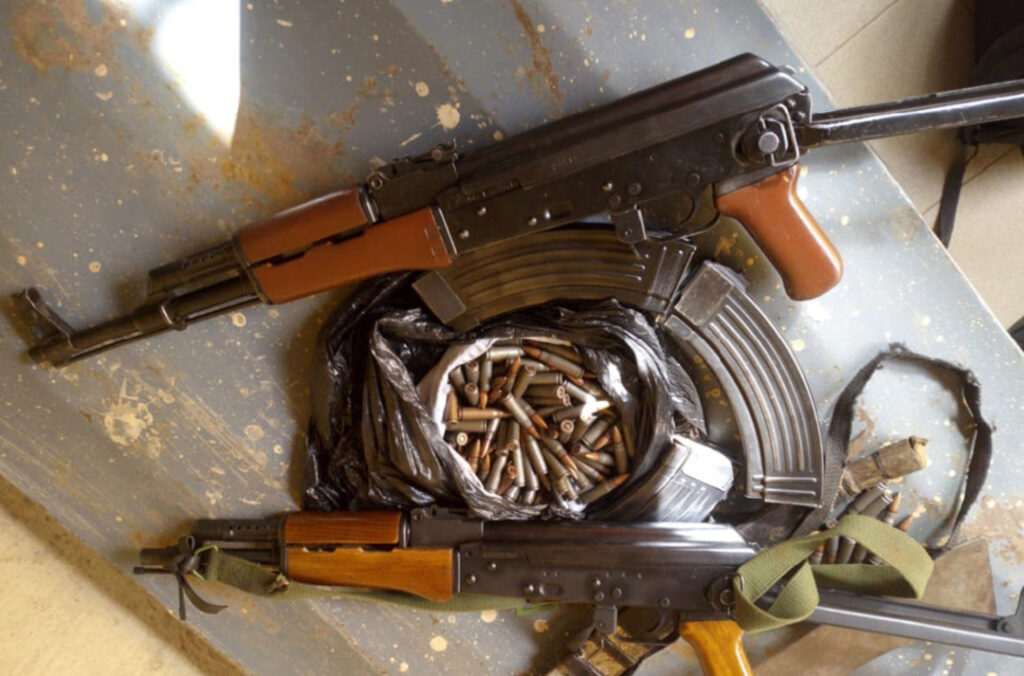ADF STAFF
Extremist groups are again trafficking weapons from Libya and other sources into the Sahel, signaling a potential escalation of violence. Analysts say the increase comes after a period of relatively low trafficking levels.
“The military presence in northern Niger and the outbreak of Libya’s second civil war in 2014 saw arms flows to the south slow down,” Institute for Security Studies (ISS) senior researcher Hassane Koné wrote.
“As demand for guns in Libya increased, jihadist groups looked elsewhere — escalating attacks on army barracks in Burkina Faso, Mali and Niger to loot their arms and ammunition stockpiles.”
A United Nations Security Council arms embargo has been in place in Libya since 2011, but due to their long life cycles, firearms from former Libyan ruler Moammar Gadhafi’s vast stocks and from other conflicts continue to circulate in the Sahel.
Conflict Armament Research (CAR), an investigative organization, tracks the movement of weapons, ammunition and explosives into conflict areas. A recent CAR study showed how arms flow in and around the Sahel.
The report said 17% of the weapons seized from Boko Haram-linked rebels in southeastern Niger were diverted from the stockpiles in Chad, Niger and Nigeria. Weapons used by extremist groups in Burkina Faso and Mali were similarly traced back to national militaries from the region.
“Battlefield losses may be expected, but the risk arises when weapons are captured by unauthorized actors who may then facilitate onward diversion or misuse,” CAR field investigator Ashley Hamer wrote for Inkstick Media.
Hamer said weapons from state stockpiles dating back to the 1970s through the ‘90s may account for as many as half of all illicit weapons that continue to spread across the Sahel.
CAR says the newest weaponry it has examined from seizures around the Sahel typically comes from four primary sources:
- Military-grade materiel illegally trafficked into or through Libya.
- Battlefield losses from raids on security forces in Burkina Faso, Chad, Mali, Niger and Nigeria.
- Smuggled handguns and shotguns that are sold on the black market in North and West Africa.
- Diversion of legally imported firearms and explosives within the Sahel.
Addressing illicit arms trafficking
As arms trafficking has expanded in the Sahel, so too have the responses of government, regional and international authorities.
In 2017, the African Union launched an initiative called “Silencing the Guns” by 2020. The deadline passed and was reset to 2030. The European Union launched Operation Irini in 2020 to enforce the U.N. arms embargo to Libya after the second Libyan civil war.
International police organization Interpol has had some success in stemming the proliferation of illegal arms trafficking in Africa through collaborations with Afripol and the U.N.
In June, Operation Trigger VIII recovered 480 firearms, identified and dismantled 14 organized crime networks, and saw 42 people arrested for firearms offences.
“Western and Eastern Africa have seen increased terrorism in the past decade,” Interpol Executive Director of Police Services Stephen Kavanagh said in a statement. “This is quickly spreading its devastating impact southwards, causing death, fear and destruction — a devastation for African communities and economies.”
Since 2009, the Economic Community of West African States has sought to ensure that imported weapons meet marking standards set out in the Convention on Small Arms and Light Weapons, Their Ammunition and Other Related Materials.
Hamer says weapons manufacturers and exporting countries could do more to help limit the importing and diversion of illicit arms that flow into the Sahel.
“Greater transparency and collaboration in the tracing of seized materiel should be promoted among manufacturers, import and export licensing authorities, law enforcement and judicial investigators,” she wrote. “Procedures for post-shipment controls of exports in cooperation with the stated end user could be developed, not only to confirm immediate delivery but to monitor end use months or years later.”

